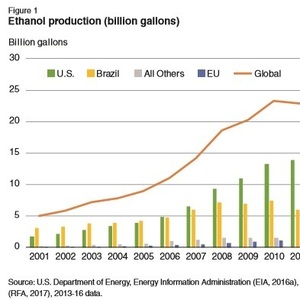USDA ERS publishes report on ethanol, DDGS export opportunities

USDA Economic Research Service
November 2, 2017
BY Erin Krueger
In October, the USDA Economic Research Service published a report on global ethanol mandates that outlines the opportunities for exports of U.S. ethanol and distillers dried grains with solubles (DDGS).
According to the report, more than two dozen countries currently have ethanol mandates in place, while many others have ethanol targets or encourage use of the fuel without setting official requirements. The ERS said that increased use of ethanol globally could provide strong and diverse export opportunities for U.S. ethanol and coproducts.
Advertisement
Advertisement
The 32-page report includes case studies on market potential in Argentina, Canada, China, Colombia, India, Japan, Philippines, Thailand and a group of other countries.
According to the report, the U.S. exported ethanol to more than 50 countries in 2015. Over the past five years, more than 100 countries have imported fuel ethanol from the U.S. The report states that if major economies start implementing their existing target blend rates, U.S. ethanol producers would have much larger foreign market opportunities.
Traditionally, Canada, Brazil and the European Union have been the primary importers of U.S. ethanol. While Canada continues to be the top destination for U.S. ethanol exports, the share of Brazil and the EU have fallen in recent years.
Advertisement
Advertisement
Regarding DDGS, the report shows exports went to 50 countries in 2015, and more than 70 countries over the past decade. According to the report, the U.S. has found export opportunities for DDGS beyond its traditional trade partners of Canada, China, the EU and Mexico. South Korea and Vietnam in particular have recently increased imports of U.S. DDGS.
A full copy of the report can be downloaded from the USDA ERS website.
Related Stories
The U.S. Department of Energy’s Office of Energy Efficiency and Renewable Energy is soliciting public comments on a preliminary plan for determining provisional emissions rates (PER) for the purposes of the 45Z clean fuel production credit.
On July 17, Iowa’s cost-share Renewable Fuels Infrastructure Program awarded $1.12 million in grants for 20 applicants to add B11 and 4 applicants to add E15 to retail sites. This was the first meeting following the start of RFIP’s fiscal year.
Par Pacific Holdings Inc., Mitsubishi Corp. and ENEOS Corp. on July 21 announced the signing of definitive agreements to establish Hawaii Renewables LLC, a joint venture to produce renewable fuels at Par Pacific’s refinery in Kapolei Hawaii.
A new study published by the ABFA finds that the U.S. EPA’s proposal to cut the RIN by 50% for fuels made from foreign feedstocks, as part of its 2026 and 2027 RVOs, could stall the growth of the biomass-based diesel (BBD) industry.
Reps. Mike Flood, R-Neb., and Troy A. Carter, Sr., D-La., on July 21 reintroduced the SAF Information Act. The bill directs the U.S. EIA to more explicitly include SAF data in its weekly and monthly reports.
Upcoming Events










